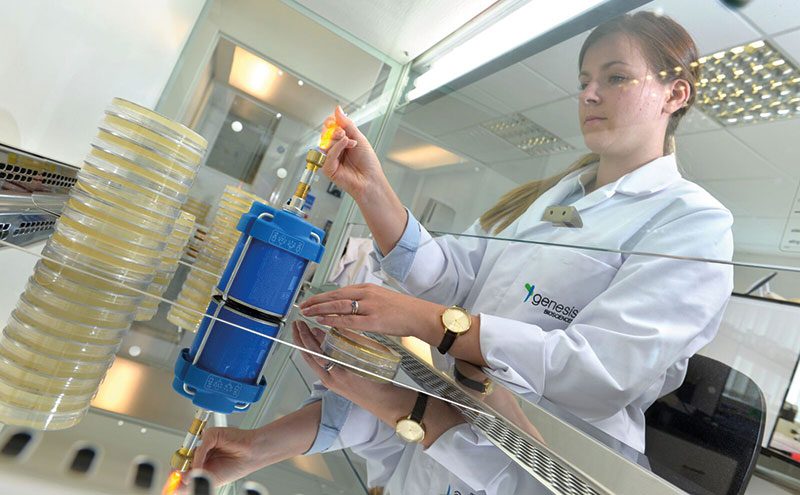Katie Edwards, R&D scientist at Genesis Biosciences, explores the causes of malodour in the workplace and offers her thoughts on why biological odour neutralisers offer a better alternative to their chemical counterparts.

Scents can be deceiving; a fresh smelling workplace doesn’t necessarily mean a clean and safe workplace. In fact, a nice smelling room can be even more harmful than you’d expect. Washrooms and facility areas in workplaces are the ideal breeding grounds for bacteria; in frequently used communal areas at work, it’s inevitable that illnesses can spread fast and easily, it’s imperative that workplace cleaners tackle the root cause of malodour to prevent illness and protect employees.
How is malodour caused and why shouldn’t you just mask the smell?
Malodour is caused by ‘bad’ bacteria which grow on hard surfaces and waste, like toilet basins or in waste bins. These bacteria will break down any soiling present and release malodourous compounds.
To tackle malodour, some businesses use ‘odour maskers’ to hide the bad smells in public areas, within washrooms or from bins; however, these products don’t tackle the problem at source and are effectively shortcuts.
That’s because odour masking products don’t fundamentally work. The perfume hides the bad smell initially, but the smell will come back, and the bacteria present can continue to multiply. This means harmful bacteria, including E.coli, can continue to thrive and malodour continues to build, potentially creating a significant hazard to employees.
Businesses should opt for products that can increase cleaning efficiency, reduce costs and labour, while also being environmentally responsible, and protecting the health and safety of their employees.
What are biological odour neutralisers?
Chemical or enzymatic cleaners work at the beginning, but have no mechanism to provide long-term effectiveness. A probiotic-based biological odour neutraliser differs from its chemical counterpart because it contains beneficial bacteria, often in spore form, which supports the cleaning action the product is trying to fulfil.
These beneficial bacteria penetrate deep into tiny imperfections and pores where persistent dirt hides, continuing to work long after the product is applied. The beneficial bacteria grow and naturally compete with and can overtake the harmful bacteria as well as breaking down malodour causing compounds.
The use of beneficial bacteria rather than enzymes alone is key and helps to differentiate between a number of ‘bio’ cleaning products on the market. Enzymes only provide an effect immediately after the initial application, in this respect they work in a similar manner to the surfactants contained within chemical cleaning products.
Enzymes also have safety concerns as they are a known cause of allergic reactions and furthermore are not always specific to the malodourous compounds present. Bacteria, however, provide a very distinct advantage in that they continually produce specific enzymes right where they are needed to break down the targeted malodour causing compounds.
The energy created through this process allows the beneficial bacteria to thrive in the area of application; this creates competition which can reduce the number of harmful bacteria and it also ensures that the biological product continues to work on breaking down soiling for longer periods of time. This is fundamentally what gives them long-term cleaning efficacy.
The benefits of biological-based products over chemical alternatives.
Chemical odour masking technologies are only effective for a short period of time and are easily overpowered because they do not tackle the source of the malodour.
Biological odour neutralisers differ as they are designed to tackle malodour at its source. They contain specific Bacillus strains to degrade specific malodourous compounds and compete with malodour-causing bacteria. They are targeted by design, unlike chemical counterparts that are not tailored to application-specific cleaning challenges.
In addition to the cleaning benefits of biological odour neutralisers, the products also provide a much larger return on investment than traditional chemical cleaners for contractors because they can reduce labour costs in the medium to long-term.
Workers don’t need to apply biological odour neutralisers as frequently because the active Bacillus continue breaking down malodourous compounds and working against the bad bacteria, which keeps facilities cleaner for longer and prevents the build-up of bad smells.
In the long-term, probiotic-based cleaners do not corrode surfaces and offer safe and long-lasting cleaning protection without abrasive action. In comparison, powerful chemical cleaners can cause long-term damage to surfaces and pose a corrosive or irritant hazard.
Probiotic-based cleaners have a much smaller environmental impact, as they contain less oil-derived raw materials like surfactants or solvents and are therefore more sustainable. The active agents in probiotic cleaners, the bacteria themselves, are produced by fermentation, where they grow on natural materials in low energy requiring processes and are then concentrated and stabilised ready to be incorporated into products.
Genesis Biosciences has developed unique bacillus strains to address cleaning challenges, recently launching its Evogen Professional range of biological cleaners for the facilities management industry.
There are three facets to the approach. The low level of fragrance with this range helps to immediately reduce malodour perception. A chemical odour counteractant then binds any existing malodour molecules, by encapsulating them and making them too large for the nose to detect. The bacillus in the product degrade organic soiling, such as proteins and starch in the application area. The products of this degradation are then taken into the bacteria cells and used for growth. They also degrade any smelly chemicals already present, like volatile fatty acids (VFAs), thus, the slow breakdown of these materials by bad bacteria, which would otherwise result in the formation of many malodorous compounds, cannot occur.
By preventing malodour at the source, the product delivers superior, long lasting results against a wide range of odours.







